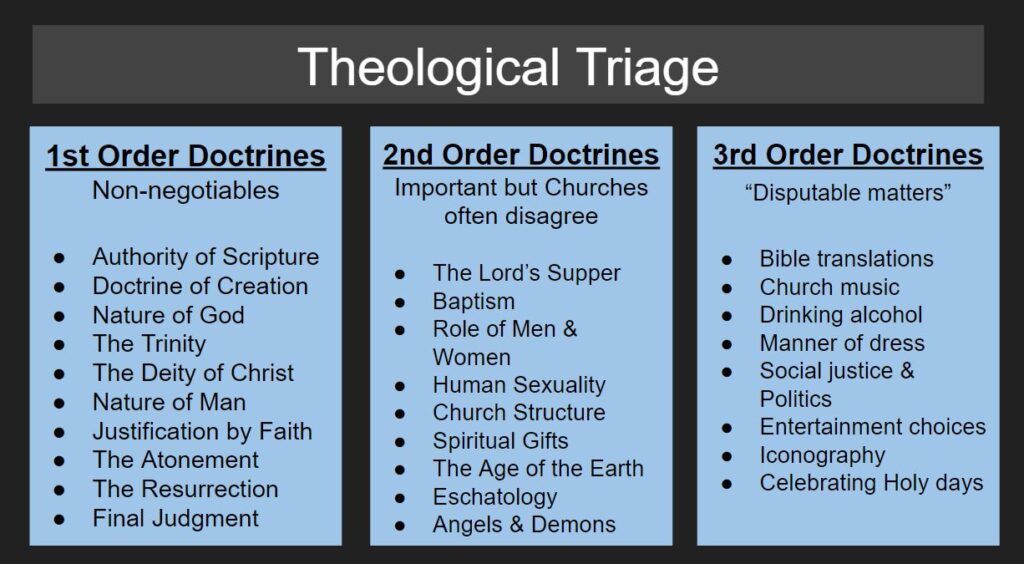When approaching biblical doctrines, it’s been suggested that the student apply something referred to as “theological triage.” Albert Mohler defines “theological triage” as “a responsible biblical way of weighing theological issues and biblical doctrines understanding which are of first importance.” By using the phrase “of first importance,” Mohler is referencing a statement made by the Apostle Paul in his epistle to the Corinthians.
Now, brothers and sisters, I want to remind you of the gospel I preached to you, which you received and on which you have taken your stand. 2 By this gospel you are saved, if you hold firmly to the word I preached to you. Otherwise, you have believed in vain.
For what I received I passed on to you as of first importance: that Christ died for our sins according to the Scriptures, that he was buried, that he was raised on the third day according to the Scriptures, and that he appeared to Cephas, and then to the Twelve. After that, he appeared to more than five hundred of the brothers and sisters at the same time, most of whom are still living, though some have fallen asleep. Then he appeared to James, then to all the apostles, and last of all he appeared to me also, as to one abnormally born. — I Cor. 15:3-8 NIV (bold mine)
In doing this, Paul implies that certain beliefs are essential to the Gospel. Christ’s death on the cross for our sins, His burial and bodily resurrection, are framed as of “first importance” to the Christian. It is upon this that we are “saved” and must take our “stand.”
Framing some doctrines as of “first importance” doesn’t imply that other biblical beliefs are unimportant, but that they are not essential to salvation. For example, when the Philippian jailer cried out, “What must I do to be saved?” the apostle Paul did not produce a checklist of doctrines the jailer must subscribe to. He simply said, “Believe in the Lord Jesus, and you will be saved—you and your household” (Acts 16:31 NIV). This incident reinforces the idea that certain beliefs — specifically, Christ’s Person, substitutionary death, burial, and resurrection from the dead — are indeed essential for salvation.
However, the Bible contains numerous other important doctrines. Paul wrote to young Pastor Timothy, “Till I come, give attention to reading, to exhortation, to doctrine” (I Tim. 4:13 NKJV). Bible doctrine can simply be defined as a body of theological teachings. These teachings cover a broad range of subjects including things like the nature of God, the creation of the cosmos, the nature of man, angels, sin, the moral order, human sexuality, marriage, the nature of Christ, the Trinity, the Holy Spirit, the atonement, baptism, spiritual gifts, death, heaven and hell, the devil, the second coming of Christ, etc., etc. Bible doctrines are a set of accepted beliefs which form the parameters for the Christian faith.
While second order doctrines are not essential to salvation, they remain intrinsically connected to a larger worldview and body of beliefs. The idea that believing in Jesus, His death on the cross and resurrection from the dead, saves those who embrace it, intersects numerous other “secondary” doctrines. For example, Christ’s death was salvific because He was sinless. This extends to belief in the Virgin Birth, that Jesus actually had no biological father. Also, wrapped up in this is the belief that Christ was in fact the incarnate God (Jn. 1:1, 14). Furthermore, Jesus’ death on the cross imports beliefs about human sin and depravity. We are sinners and we cannot save ourselves. These beliefs trace all the way back to the Book of Genesis, the creation of humans in the image of God, their Fall into sin, and God’s redemptive plan to reclaim humanity for Himself. So while some doctrines may not be essential to salvation, they intersect and build off of numerous “secondary” doctrines. We cannot say, “Believe in the Lord Jesus, and you will be saved,” without importing other doctrinal ideas — like Christ’s sinlessness, His deity, the blood atonement, human sin, eternal life, etc.
While second order doctrines are not essential to salvation, they remain intrinsically connected to a larger worldview and body of beliefs.
So who decides what Bible doctrines are essential or secondary?
Here’s where things get a bit sticky. Augustine famously said, “In essentials, unity; in non-essentials, liberty; in all things, charity.” If this formula is reasonable then “liberty” should be extended when debating ‘non-essential’ or ‘secondary’ doctrines. Augustine does not define what these “non-essential” doctrines are, only that we should extend grace and charity when debating them. Augustine likely knew that separating primary from secondary doctrines is often a matter of vigorous debate.
Here’s a typical division of some biblical doctrines and the tiers of importance they are often placed.

Of course, some will disagree with specifics of the above chart. For instance, issues of eschatology (study of the end times), the role of men and women, the age of the earth, or the doctrine of creation might move up or down the scale of importance for individuals and churches. The “3rd Order Doctrines” are often classified as “matters of conscience” or “disputable matters” (I Cor. 15:1). These are mostly issues that are addressed in Scripture but without dogmatic emphasis.
In his essay on “theological triage,” Al Mohler writes:
First-level theological issues would include those doctrines most central and essential to the Christian faith. Included among these most crucial doctrines would be doctrines such as the Trinity, the full deity and humanity of Jesus Christ, justification by faith, and the authority of Scripture… The set of second-order doctrines is distinguished from the first-order set by the fact that believing Christians may disagree on the second-order issues, though this disagreement will create significant boundaries between believers. When Christians organize themselves into congregations and denominational forms, these boundaries become evident.
Mohler correctly points out that the debate about “second-order issues” is important enough to “create significant boundaries” between churches and believers.
A good example is the recent debates about complementarianism (the belief that men and women have different but complementary roles and responsibilities in marriage, family life, and religious leadership) and egalitarianism (the belief that there are no gender-based limitations to functions or roles men and women can fulfill in the home, the church, and the society). In April 2021, popular female Bible teacher Beth Moore tweeted decrying complementarianism as “a doctrine of man” and not of “1st importance,” even apologizing for her past complicity in it. She received significant pushback, some even arguing that the Role of Men and Women should not be viewed as a debatable issue. Wherever one lands on the complementarian/egalitarian debate, it’s a serious enough issue to divide churches.

Another example is the Historical Adam debate. While some consider the belief in a literal Adam as irrelevant to one’s salvation, others consider it as foundational to a proper understanding of the authority of Scripture. In other words, if someone mythologizes the creation account, what prevents them from mythologizing other biblical accounts? Mythologizing certain segments of Scripture creates a interpretative chain reaction. If Christ is the literal “Second Adam,” then that implies a literal “First Adam.” But if the First Adam was just a myth, why is the Second Adam a Fact? Truth is, those who argue that Adam and Eve were mythological, not literal, figures, often do so to accommodate theories of naturalistic evolution. One can better jibe theories of naturalistic evolution with a mythical Adam than a literal one. However, framing Adam and Eve as mythological figures has a domino effect upon other first-level beliefs (like the Nature of Man and his Fall into sin). But does this require we treat the subject of Adam and Eve as a first-level doctrine? Some would say yes.
This highlights how one of the dangers in framing certain doctrines as second-order is that it potentially undermines the authority of Scripture. For example, Denny Burk has pointed out that “two of the most lauded egalitarian books the last few years [“Jesus and John Wayne” and “The Making of Biblical Womanhood“] are written by authors who deny inerrancy.” Is this a coincidence? Similarly, you’ll discover that many of those who mythologize Adam and Eve have little issue mythologizing other controversial texts. In other words, arranging doctrinal hierarchies influences and potentially subverts one’s entire approach to Scripture.
“All Scripture is God-breathed,” wrote the Apostle Paul, “and is useful for teaching, rebuking, correcting and training in righteousness” (II Tim. 3:16 NIV). In this sense, we are called to uphold ALL Scripture, not just those we consider first order. By placing some Scripture in a lower hierarchy, we can make obedience optional. Burk notes,
If you believe the Bible teaches male headship, you are not free to disobey or dishonor that teaching. We must always speak and live as if we believe the Bible to be true. If the Bible is God’s word (and it is!), then we must honor its teaching in all its particulars. We must never do otherwise (Romans 14:23). It is an abuse of “theological triage” to make obedience to second order doctrines optional.
Shrinking the category of “essential” doctrines often serves one’s ideological aims. The less doctrines we consider “of first importance,” the more theological wiggle room we are afforded. Of course, some doctrines do not appear essential to one’s salvation. Saints can disagree on the exact age of the earth and still remain in fellowship. However, without an organic view of biblical doctrines, we are free to randomize biblical worldview elements, thereby undermining all of Scripture.
Christ’s death on the cross for our sins, His burial and bodily resurrection, are described as of “first importance.” By affirming these truths, we are “saved.” However, these first order doctrines are intertwined with second order doctrines. The Nature of Humanity, Original Sin, the Virgin Birth, blood atonement, Death and the Afterlife, the Second Coming of Christ, the Final Judgment, Heaven and Hell and numerous other doctrines are tethered to these “essentials.” Believing in Christ is essential to salvation. But believing anything one wants about Christ, isn’t.
Thus, the ‘problem’ with secondary or non-essential Bible doctrines is that they are conjoined with ‘essential’ doctrines. To remove one, or downgrade its importance, is to compromise the entire chain.
















If I may offer some thoughts Mike.
The doctrinal threshold for being raised from death in Adam to life in Christ is indeed quite narrow.
“…if you confess with your mouth Jesus as Lord, and believe in your heart that God raised Him from the dead, you will be saved” (Romans 10:9)
However, once having been joined to Christ ,filled with the Spirit and made a new creature, some things will now be true of them that are universally present in all the children of God.
First among them is the knowledge that the ancient Christian scriptures ARE the self revealed mind of the God who has saved them. That’s the foundation for the new life they have been redeemed and commanded to. Someone who refuses to believe the Bible when they don’t like something God says demonstrates that they have not been truly made new.
Along these same lines, there are crystal clear moral teachings in the scriptures that the disciple of Christ is not at liberty to reject or innovate upon. Human sexuality and the function of gender for instance was designed by God before the presence of sin in His creation. This has not been seriously disputed in the entire history of the church age until recently in the western world.
Which brings me to my last point . One which you touched on in a previous article a while back.
Much of this expanded discussion of what views are of what order have been caused by a newly embraced conformity to the world that would have been unthinkable in previous generations of faithful Christians. The idea of a homosexual christian identity for example is non existent in church history until the last few decades in the western world. Not because there was no homosexuality, but because the notion of a righteous christian homosexual identity was equal to the notion of righteous robbery or adultery. It was a moral impossibility. Nobody even suggested it.
This started in the visible church exactly when it started in the world. Hath God said?
The bottom line is that while what someone must believe to be saved is minimal, the evidence of that salvation, of biblical necessity is demonstrated by their yielding, or not, to much of what many would put in the second and maybe even some of the third tier. A person who proclaims that the God of the Bible condones gay sexuality is not a christian by any any historically biblical orthodox definition. Again, for instance.
===============================
1st Jon 3: (NASB)
1-See how great a love the Father has bestowed on us, that we would be called children of God; and such we are. For this reason the world does not know us, because it did not know Him. 2-Beloved, now we are children of God, and it has not appeared as yet what we will be. We know that when He appears, we will be like Him, because we will see Him just as He is. 3-And everyone who has this hope fixed on Him purifies himself, just as He is pure.
4-Everyone who practices sin also practices lawlessness; and sin is lawlessness. 5-You know that He appeared in order to take away sins; and in Him there is no sin. 6-No one who abides in Him sins; no one who sins has seen Him or knows Him. 7-Little children, MAKE SURE NO ONE DECEIVES YOU; the one who practices righteousness is righteous, just as He is righteous; 8-the one who practices sin is of the devil; for the devil has sinned from the beginning. The Son of God appeared for this purpose, to destroy the works of the devil. 9-No one who is born of God practices sin, because His seed abides in him; and he cannot sin, because he is born of God. 10-By this the children of God and the children of the devil are obvious: anyone who does not practice righteousness is not of God, nor the one who does not love his brother.
11-For this is the message which you have heard from the beginning, that we should love one another; 12-not as Cain, who was of the evil one and slew his brother. And for what reason did he slay him? Because his deeds were evil, and his brother’s were righteous.
Hey, Greg, nice to see you around these parts!
Christians can’t even agree on first order doctrines, unless you want to call Jesus the person the only first order doctrine, and even who he was had to be determined at the Council of Ephesus. That’s quite literally what my last post was about. Not the Council of Ephesus. The fact Christians can’t agree even on what it means to be saved.
This feels like what happens when convictions clash. We feel the need to make others’ match our own. I get that, but people’s convictions are for their own benefit, and for those that would already agree with them. Plying to change other’s convictions seems too much like a cerebral exercise, benefitting very little. If you were to convince someone to shift over, you’d only be changing their mind, not their convictions themselves.Only God can grant the latter.
I’ve often wondered about these “second order doctrines.” If they’re important, why can we disagree about them? If we can disagree on them, how can they be important?